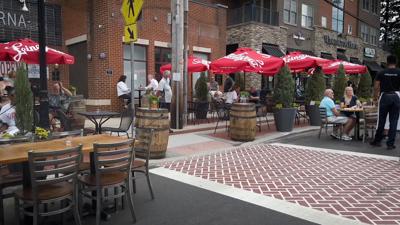State Speaker of the House Peter Schwartzkopf (D-Rehoboth Beach) is hoping to continue providing aid to Delaware's restaurants by making permanent protocols introduced at the start of the pandemic to both help them now as the pandemic rages on, and into the future another option for people to enjoy their local favorites how they choose.
"Back during the initial part of the pandemic, when all the businesses were pretty much shut down, the governor put out an executive order that would allow the restaurants to have takeout alcohol and, eventually, there was outside seating and those types of things," Schwartzkopf told WDEL. "That alone was responsible for a lot of businesses staying afloat."
It was so effective at providing restaurants that needed help while facing capacity limitations and heavy infrastructure investments to satisfy public health code requirements that lawmakers extended the provisions when the law was set to expire previously - largely because the problems those organizations faced continued to linger.
"I talked to a lot of businesses who said, without the outside dining and without the takeout alcohol, they would have gone under. It's a very important bill. We realized right away how important it was for the restaurants," he said. "We were out of session for six months [after it's initial passage] and we didn't know how long the Governor's executive order would stand. We were afraid the governor might cancel this order [while we were gone,] then the restaurants would be back to square one. They wouldn't be allowed to do it, because there would be no official were permission for them to do it. So we codified the provision for outside dining as well as takeout alcohol and put a sunset provision on it...We're into a session now where these provisions will sunset on March 31 of 2022, and we didn't want to do that."
Between February and April of 2020, Delaware saw 66% of its 50,800 restaurant and food industry jobs disappear. House Bill 290, which passed unanimously in the Administration Committee with three favorable votes and two on the bill's merits, will permanently enact the allowances introduced as a necessity of the pandemic so that restaurants can continue those practices in perpetuity.
"Basically, what this bill does is it takes the sunset provision off the existing code of what we have. So what we've been living under for two years now--two-and-a-half years, somewhere in that neighborhood--is what will become the future," Schwartzkopf said. "Everything that was in the bill before is still in the bill."
That includes limitations on how much alcohol a restaurant is allowed to provide for a takeout order, a stipulation to satisfy liquor and package stores concerned with losing their own business. It' an issue Schwartzkopf doesn't necessarily think is going to be a problem, as pricing structures for a bottle of beer from either a restaurant or package store doesn't really dictate abuse of the bill by the former, from a customer perspective, but he was happy to satisfy their concerns either way. It also establishes protocols for the alcohol commissioner to conduct hearings and license suspensions for violating these rules.
During the committee hearing where the bill advanced, Schwartzopf said no one attended to provide public comment--either as citizens or business owners--but noted he's heard nothing but support for the continuation of this policy.
"I can tell you that this is very important to, and very popular with, the restaurant industry, especially now that it looks like COVID has gone wild again. There's going to be people that won't be going inside restaurants. So having the sit down or even the takeout with a drink is very popular, especially down here in a resort area. So if we're going to have to--well, I don't think we're going have to do it, I think the public will do it on their own. They just won't go out to dinner. But this gives the public that still wants to go out to dinner but wants to do it in a safer way, it gives them the mechanism to do it."
The bill will next head to the floor for a vote in the House.












